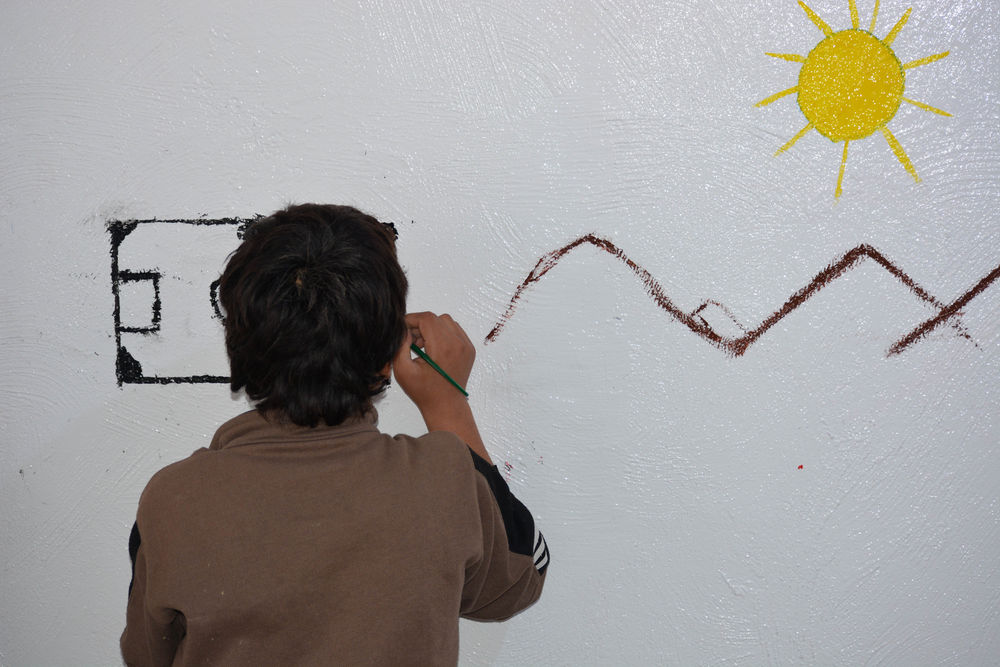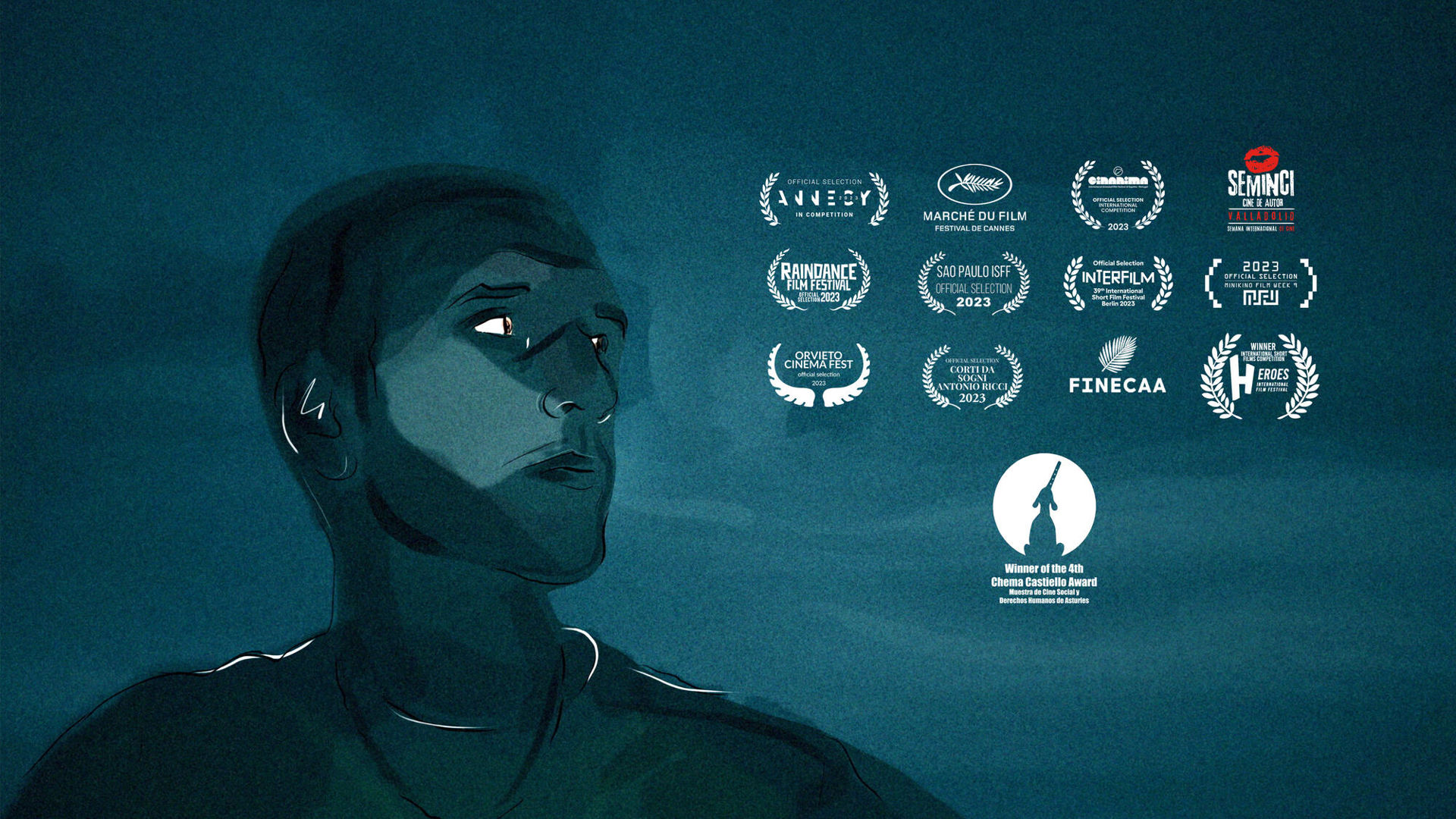Al-Hol camp is on the southern outskirts of the town of Al-Hol in northeast Syria. Following the defeat of Islamic State (IS) in Syria, the camp is now effectively an outdoor detention centre where people who were displaced during fighting between the Syrian Democratic Forces (SDF) and IS in 2018 are detained. As of October 2023, over 40,000 people were living within this sprawling open-air confinement, with 93 percent of the people at Al Hol camp are women and children.
For those who have experienced traumatic events, such as violence and displacement, the camp has only exacerbated their anguish. The symptoms of post-traumatic stress disorder, depression, and anxiety loom large over the camp, casting a shadow over the mental well-being of its residents:
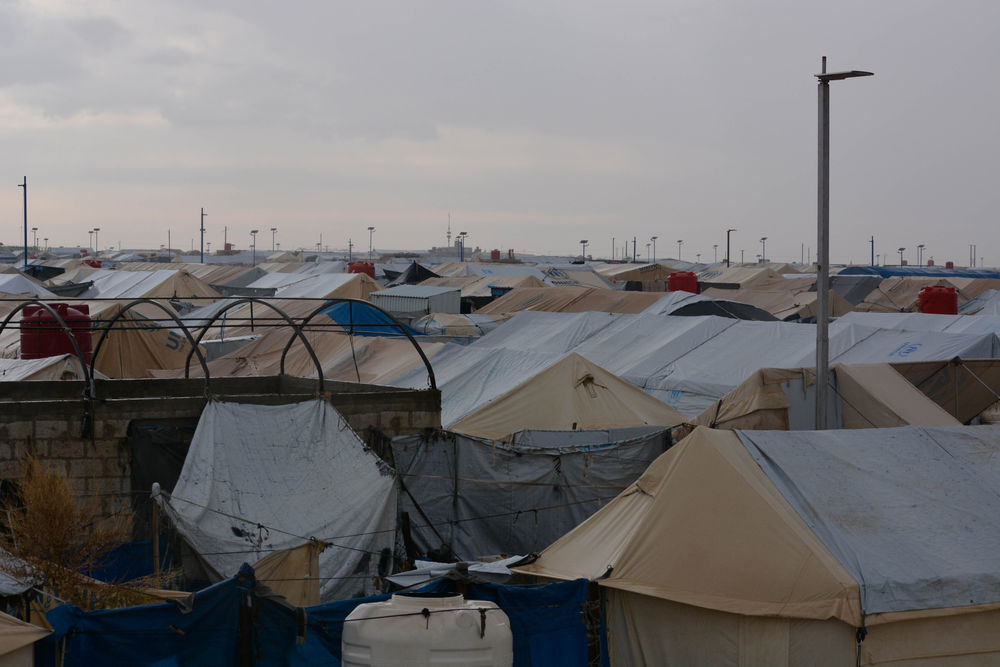 Al-Hol camp in northeast Syria. © MSF
Al-Hol camp in northeast Syria. © MSF
1. Abu Omar, 43, Iraqi from Anbar:
I was displaced with my family (A wife, 4 daughters & 1 son, and parents) from Iraq in 2015 due to the intense bombardment by the Iraqi forces and ISIS. It was easy to cross to Syria, as the border was open at that time. However, the circumstances around our displacement were harsh and it negatively affected my mental health, can you imagine we left our houses and everything behind?
The bombardment was non-stop, day and night. We saw people being killed before our eyes. My kids would come to me seeking safety, but I was helpless as well. We ate leaves and grass at some point out of hunger on our 3-day trip to Syria.
I used to be a landowner. My father and I used to be government staff and life seemed to be alright, but everything is gone now. I have lived here in this camp for 8 years. All goods are getting expensive, I sometime work to get only 10,000 Syrian Pounds (7 cents USD) per day. I have a cart to sell foodstuff.
My mom had renal disease. She needed dialysis every week. One day the dialysis session was delayed, and she was really in pain. I begged a local health Organisation to refer her to Hassakeh as soon as possible but they said the doctor delayed her case for tomorrow. I returned to the tent, and I was rubbing her chest to ease her pain, but she died in my arms! I showed her death certificate to them (the local health organisation), I told them she died before your eyes, and you did nothing!
I really feel hopeless here. Everyone wants to improve his life, but what can I do while I am surrounded by all these fences! I can’t cope with life in here, I really miss my country (Iraq) and relatives. I want to be back as soon as possible.
I come here to MSF’s mental health clinic to get rid of the negativity in our lives. It is nice to have someone who can listen to you and give you his time and attention. I used to have some relatives here and they were repatriated last year.
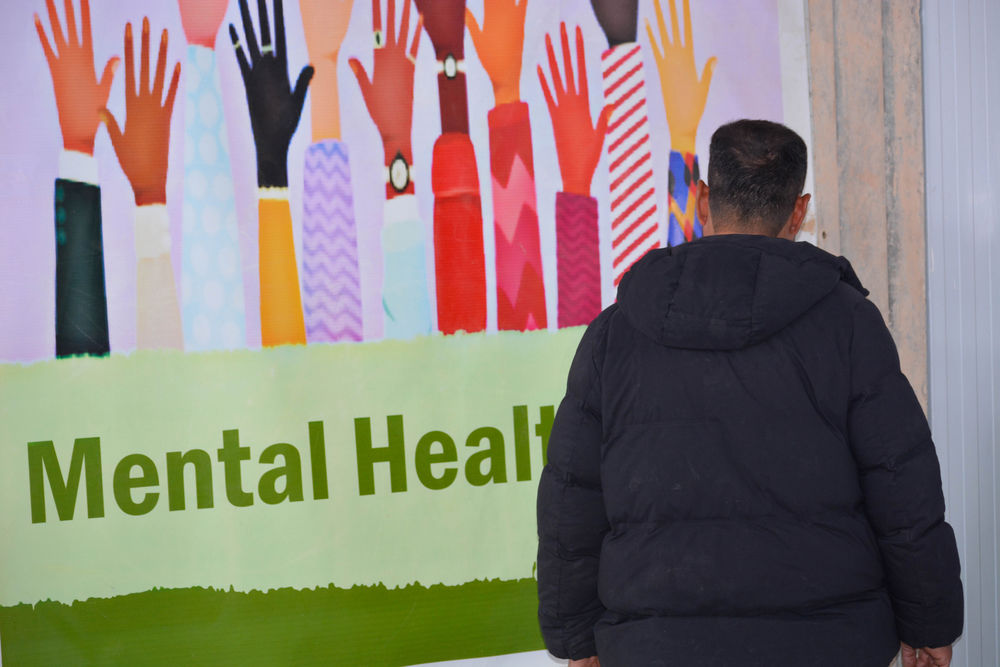 Abu Omar, Iraqi from Anbar. © MSF
Abu Omar, Iraqi from Anbar. © MSF
2. Om Othman, 42, Syrian from DeirZour:
At the beginning, we were living in DeirZour countryside but when the war became closer, we were first displaced to Baghouz town and then to AlHol camp. We spent one year moving from one place to another.
My husband was killed when ISIS controlled DeirZour in 2014. He was accused of dealing with FSA (Free Syrian Army). I was left with 5 daughters and 1 son; can you imagine the responsibility that I was burdened with!
During displacement, the family was split due to shelling, my son (11 y/o) with his uncles in the village, and me with my daughters in Hajin town. For 6 months, I didn’t know anything about my son and my siblings. We were so poor and had to eat grass to survive. No one came to help us or advocate for us. I even had diabetes and high blood pressure because I was so afraid of the sounds of the bombing.
I can’t forget any of the horrible things we have been through.
I remember during Ramadan in that year of displacement, I asked my little girl to take some food to her older sister. She was married and lived close to our house. I was looking to the street through the window, and I witnessed a horrible motorcycle accident, it hit someone. I said to myself “pity that person! War, displacement and above all motorcycle accident!”, Then I saw my little girl’s twin running to me shouting “Mom, Mom it is your daughter!”. For a moment, I was in a real shock. I dressed quickly, and I ran in the street. A relative of mine gave me a ride to the hospital. But thankfully, after two hours, my daughter woke up from anesthesia as she underwent surgery in her leg.
When I arrived at AlHol, I was afraid of being imprisoned by SDF. I felt lonely, with none of my siblings around. One day, an old man asked my little girl about her father’s name, and it turned out that he knows us, and he is from the same tribe. He asked us, “how do you feel, do you need any help?”, we said “we are hungry and tired”. He said, “don’t be”, “I will provide you with a tent, food and everything”.
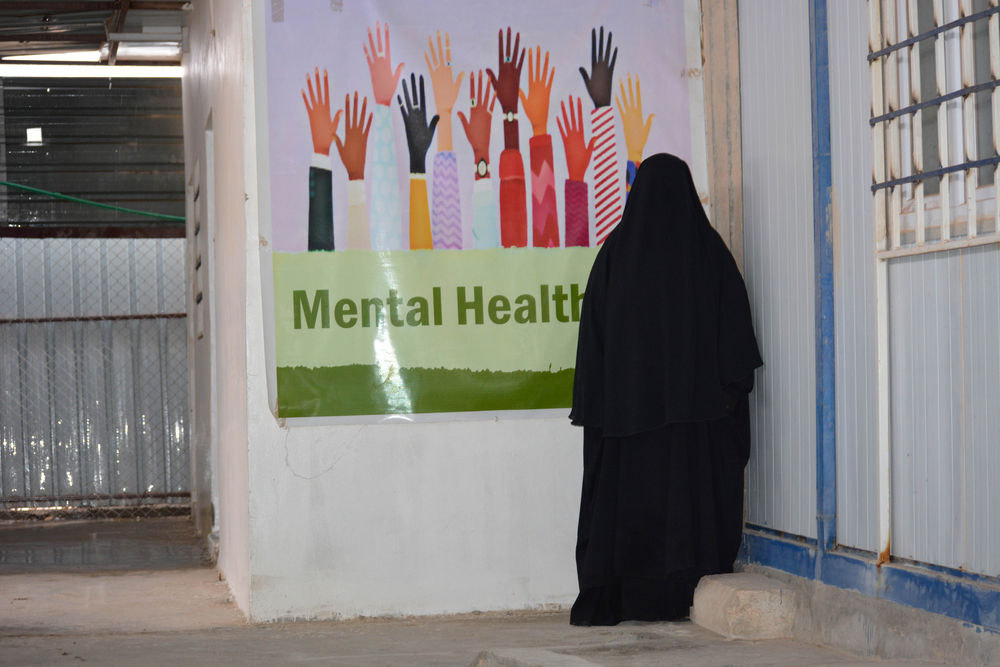 Om Othman, Syrian from DeirZour. © MSF
Om Othman, Syrian from DeirZour. © MSF
I was living in a phase where almost all women were extremists. They were criticising me for sending my daughter to an International organization-supported school. They wanted me to register her in one of Qur'an teaching sessions, but I refused, as I believe school is also important. I managed then to change my phase in the camp.
The first time I left the camp was after 3 years, when my 6-year-old daughter was burned while she was playing with another kid. I was referred to HSK, but it was a stressful experience especially that there was an armed man escorting us in the ambulance. After 19 days in HSK hospital, she succumbed to her injuries and passed away, and guess what! she is the same one who had the motorcycle accident.
One of the things that I can’t also forget is when my only son was kidnapped by a gang inside the camp. They asked for 1500 USD ransom to release him. I really struggled to get the money borrowing from this and that, but, Alhamdulillah, he was set free after handing over the ransom.
Now I am here to have some individual sessions. I come here to cry and narrate my sorrows. When I leave the clinic, I feel as if I threw everything behind my back.
3. Um Ibrahim, 20, Iraqi:
We were living in Al Bukamal city. I am married but I don’t have kids. Our house was close to an ISIS-used facility, and it was a target. We were displaced to Al Baghouz where my male siblings were killed. My sister also suffered from amnesia.
I remember the bombing was very intense. People were hiding in ditches that were covered with blankets. I saw many people got killed either by snipers or airstrikes. A pregnant woman was shot in backbone, and now she is paralysed. She can’t move and she is living here in the camp. The two months living in the ditch felt like a tomb. We were sitting close to each other to protect ourselves from the cold.
The route was very dangerous and full of mines. It took us one week to get to the camp.
I spend most of my time in the tent. I don’t go out. We always have difficulties here in the camp regarding the distribution of food baskets and water. Sometimes there are delays, sometimes nepotism and corruption by the head of the commune.
Here in the camp, in 2020, my sister-in-law, along with her two daughters and one son all died in an arson accident. She was living with a female friend. The neighbor proposed to that female friend for marriage, but she refused, and as revenge, the neighbor’s wife set the tent on fire, but the targeted person did not die, only my sister-in-law and her kids.
My husband is in prison in Iraq. I wish I could meet him one day.
I have a positive experience with MSF. I come here to get medications because I have asthma. I also get mental health sessions which are useful to keep your spirit up.
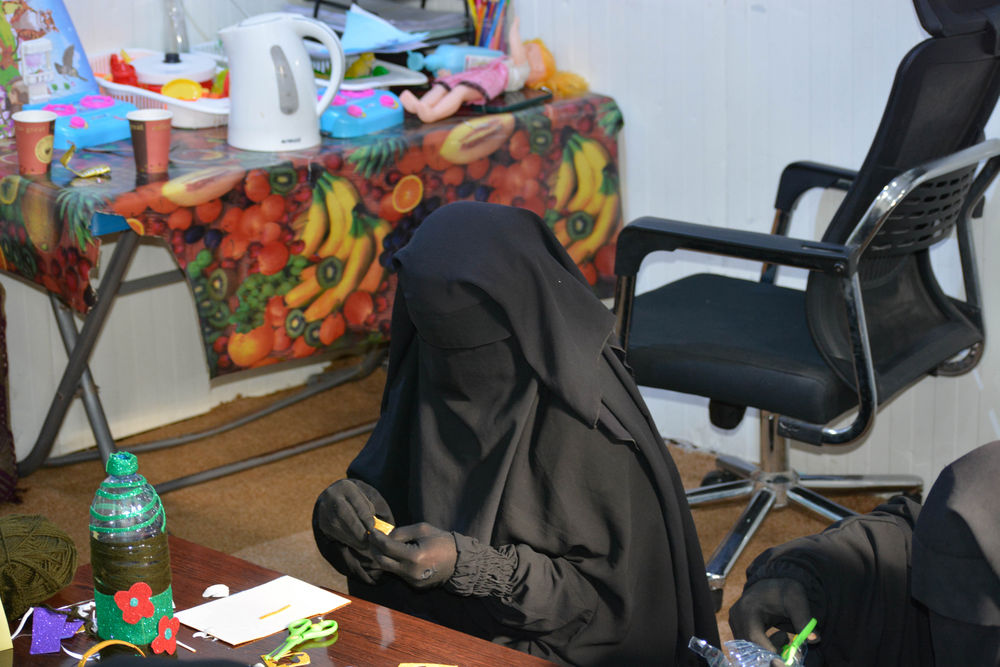 A female patient at MSF’s mental health clinic making decorations during a group therapy art session at Al-Hol camp. © MSF
A female patient at MSF’s mental health clinic making decorations during a group therapy art session at Al-Hol camp. © MSF
Mental health activities are a crucial part of any medical response. They can provide a safe and supportive environment for people to express their feelings, process their experiences, and learn coping mechanisms. MSF's activities can include individual counseling for mild to severe mental conditions (including identification and referral of psychiatric cases), psychosocial group sessions including psychoeducation, living well groups, and recreational activities.” Our patients now advocate for mental health services. Indicated by 2023 statistics; data shows that 70% of new patients are referred by the patients' relatives, friends and community", , says Sama, MSF’s Mental Health Activity Manager.
*All names have been changed to respect the anonymity of our patients at their request


